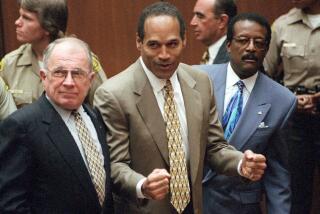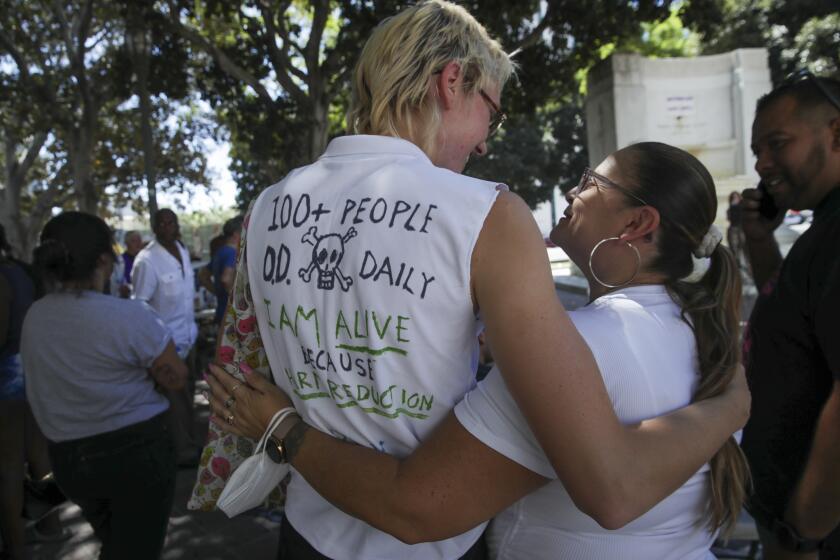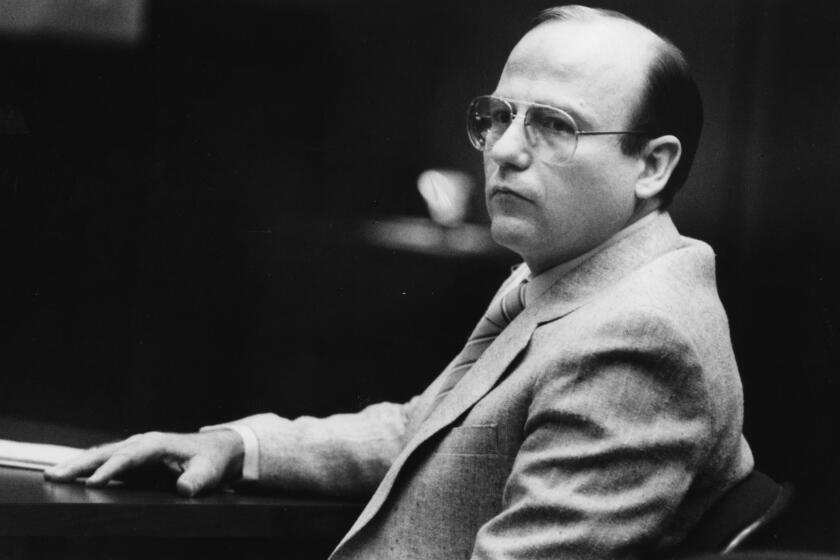D.A. Looks Into Authenticity of Simpson Juror Letter
The Los Angeles County district attorney’s office is “seriously looking into” allegations that an anonymous letter that ultimately led to the dismissal of a juror in the O.J. Simpson murder trial was fabricated.
If prosecutors determine that the document was falsified, its author--assuming he or she can be identified--could be charged with obstruction of justice. Simpson, however, cannot be retried, because his acquittal confers a constitutional protection against double jeopardy.
“We have received information which we are seriously looking into,” said district attorney’s spokeswoman Sandi Gibbons. “We have not opened a formal investigation at this time. We are in the process of determining whether a formal investigation is merited.”
Much of the information prosecutors are probing was developed during a five-month investigation conducted by the CBS television newsmagazine “60 Minutes,” which will air its findings in an unusual 26-minute segment Sunday night. According to sources familiar with the report, it strongly suggests that an anonymous letter alleging misconduct by then-Simpson juror Francine Florio-Bunten was fabricated by a member of the former football star’s defense team. The sources say the broadcasters’ suspicions particularly focus on investigator Pat McKenna and one of his associates.
“I welcome an investigation into any allegation that our jury was tampered with,” said attorney Johnnie L. Cochran Jr., who led Simpson’s defense. “But it’s outrageous, offensive and false to suggest that I, Pat McKenna or any other member of our team had anything to do with it.”
Florio-Bunten was dismissed by Judge Lance A. Ito after he received an anonymous, five-page letter, purportedly from a receptionist at a Los Angeles literary agency. It alleged that a juror matching Florio-Bunten’s description was planning to write a book about the case and that her husband had approached the agency concerning the matter.
According to court records, however, Florio-Bunten was not dismissed because of the letter, but because she failed to heed Ito’s instruction not to discuss his inquiry into the matter, and then lied to the judge concerning her indiscretion.
Florio-Bunten has denied flatly that she ever considered writing a book or misled Ito. She also has said that she would have voted to convict Simpson, which means that her continued presence on the panel would have produced a hung jury.
CBS believes its investigation tends to confirm Florio-Bunten’s version of the book incident.
“We went to 58 different literary agencies in Los Angeles, and there is not a shred of evidence to corroborate that the letter is authentic,” said “60 Minutes” correspondent Steve Kroft in an interview Friday. “In fact, the preponderance of evidence seems to point in the other direction. This has the appearance of a carefully constructed fraud.”
The letter’s author claimed to be a 20-year-old receptionist who said her family had lived in Germany during World War II and that she had been moved by Ito’s televised--and tearful--remarks concerning the wartime internment of Japanese Americans.
The producers say they could find no one who matched that description among the 58 literary agencies they checked, and none of the agencies said they had contact with Florio-Bunten or her husband.
The producers also consulted handwriting experts, executive producer Don Hewitt said, one of whom said the letter was written by one person and the envelope was addressed by another.
Other participants in the Simpson case reacted swiftly to reports of the network’s allegations.
*
In New York, where he is promoting his memoir of the trial, prosecutor Christopher Darden told a television interviewer that both he and his colleague Marcia Clark always had believed that the letter was “a fabrication and a plant.” The entire incident, he said, “smacks of obstruction of justice. . . . The only question is, who is the source of that letter?”
At a book-signing marking publication of his own account of the trial, defense attorney Robert L. Shapiro struck an ambiguous note when he was asked whether a member of the Simpson team may have been involved in jury tampering.
“Anything is possible,” he replied.
Cochran, who is prohibited from discussing the Simpson case in detail under the terms of his book contract, referred most questions to his lawyer, Larry R. Feldman, who said his client would welcome a vigorous inquiry into the matter.
“We have no information that there is any truth to these allegations,” said Feldman, one of the nation’s leading trial attorneys. “On behalf of Mr. Cochran, I categorically and unequivocally deny that he had any involvement in tampering with or attempting to influence any juror.
*
“We have no knowledge whatsoever that anyone connected with the defense did anything improper with respect to this juror,” Feldman said, “but if there is a modicum of truth concerning this allegation, we would hope that there would be a thorough and complete investigation into the matter.”
For his part, McKenna confirmed that he had been told that the “60 Minutes” report focuses on he and his girlfriend as possible fabricators of the letter.
“As I understand it,” McKenna said in a telephone interview, “this report strongly implies either that I wrote this letter or had a hand in its writing. I absolutely did not have anything to do with it. Anyone who says otherwise is not just wrong, they are lying.
“I’ve been working as an investigator for more than 20 years, and have never been accused of wrongdoing,” McKenna continued. “You know, once I got over being disturbed by this, I realized how amusing it is. I guarantee that I did not take time away from my 18-hour-a-day, seven-day-a-week job on the Simpson case to plan and commit a felony. It’s laughable.”
Both Cochran and the Simpson defense team’s jury consultant, Jo-Ellan Dimitrius, pointed out that McKenna’s investigative assignments did not involve the jurors. The letter, they added, appeared to have been written by someone with considerable knowledge of the panel.
Hall reported from New York; Rutten reported from Los Angeles.
More to Read
Start your day right
Sign up for Essential California for news, features and recommendations from the L.A. Times and beyond in your inbox six days a week.
You may occasionally receive promotional content from the Los Angeles Times.






